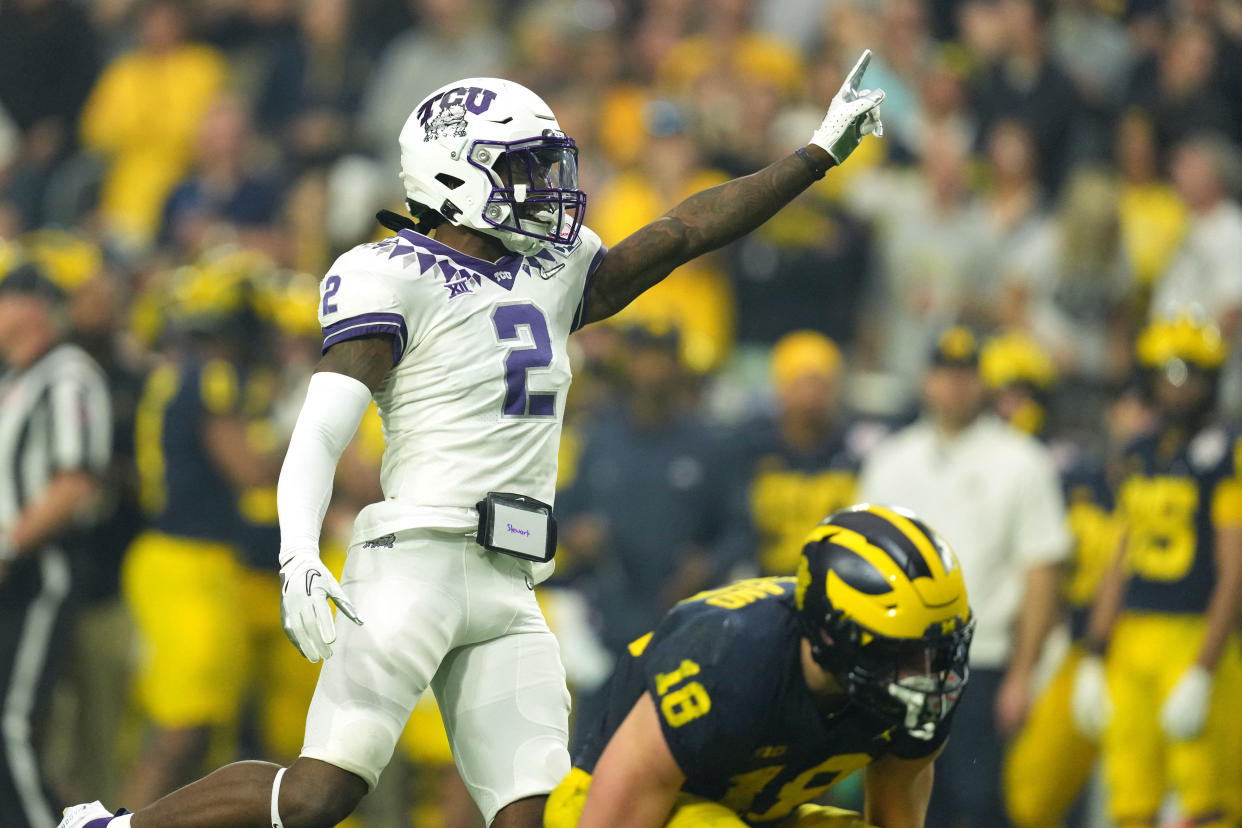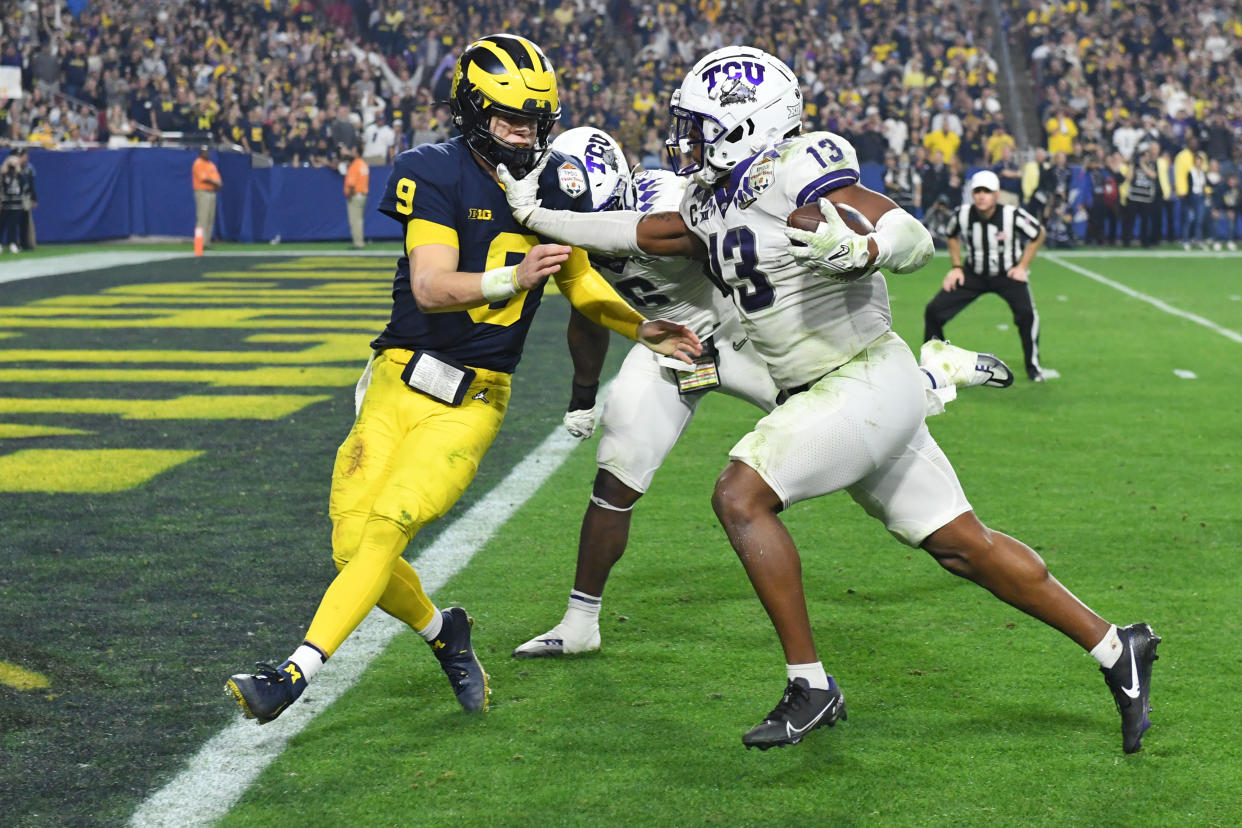Sources: TCU knew of Michigan's sign-stealing scheme prior to CFP game, used 'dummy signals' to dupe Wolverines
During TCU’s game against Michigan in last year’s College Football Playoff semifinal, trickery was afoot.
TCU coaches, having gained information on Michigan’s elaborate sign-stealing scheme, changed many of their play-call signals before kickoff. However, head coach Sonny Dykes and the Horned Frogs staff had grander ideas than just changing signals.
They pulled a fast one on the Wolverines.
They mixed in new play-call signals with old ones, using what one TCU staff member described as “dummy signals” in an effort to trick the UM staff. The dummy signals were old play-calls that had since been changed. Players were told to ignore the dummy signals and run the original play as called with the new signals.
“Sometimes we froze a play before the snap,” said one TCU coach. “We’d call a play and then we’d signal in another play with an old signal but we told players to run the original play.”
TCU, a 7.5-point underdog, beat Michigan 51-45 in that semifinal clash in the Fiesta Bowl, stunning much of the college football world in a victory that propelled Dykes’ team to the national championship game against Georgia. The Horned Frogs lost that game, 65-7, but their semifinal victory stands as one of the more incredible upsets in the history of the College Football Playoff — and, now, serves as another wrinkle in what’s evolved into the college game’s version of Deflategate.
A week into the saga, most know the details by now: A now-suspended Michigan analyst, Connor Stalions, purchased tickets to more than 40 college football games in an effort to record opponents’ signals in what has been unearthed as an elaborate, three-year scheme that has rocked the sport. In news first reported by Yahoo Sports last Thursday, the NCAA is investigating the program for a violation of the association’s rules around in-person scouting.

Over the last seven days, more news connected to the case has trickled out from various media outlets.
Most recently, the Washington Post reported Wednesday that an outside investigative firm first tipped off the NCAA last week to Michigan’s sign-stealing scheme, presenting officials with documents uncovered from computers maintained and accessed by UM coaches that outlined the system, including travel schedules and expenses for future trips.
On Thursday, the Associated Press reported that NCAA investigators were on campus at Michigan gathering information for the probe. No evidence has emerged either implicating coach Jim Harbaugh directly or showing he had knowledge of Michigan's in-person scouting operation, sources tell Yahoo Sports. The NCAA investigation is still ongoing.
The breadth of the scheme appears to be massive. Stalions purchased tickets to games at 12 of 13 Big Ten schools for a total of 30 games, according to a Monday report from ESPN. At least one of the schools produced in-stadium surveillance video of someone recording the sideline in the seat Stalions booked. He also purchased tickets to games involving CFP contenders like Tennessee, Georgia, Oregon, Alabama and Clemson, as well as the last two SEC championship games, Yahoo Sports reported Tuesday.
In one instance, Stalions bought a ticket to Tennessee’s game against Kentucky last season in view of the Volunteers’ sideline. Three minutes after the purchase, he transferred the ticket, presumably, to an associate or friend designated to record the game.
At TCU, the school has found no evidence that Stalions purchased a ticket to a home game last season, but there were ample opportunities to record the Horned Frogs in road games or in the Big 12 championship against Kansas State.
Not long after the CFP unveiled the 2022 semifinal matchups — Georgia vs. Ohio State and TCU vs. Michigan — the Horned Frogs staff began receiving phone calls from coaches across the country about what was a well-known fact in the Big Ten coaching community: that Michigan had an elaborate sign-stealing system.
Many of those on the TCU staff were unaware before the calls. Coaches from several Big Ten schools, including Ohio State, informed TCU coaches of the scheme.
“Literally everybody we talked to knew,” said one TCU coach. “They’d say, ‘Just so you know, they steal your signals and they’re going to have everything so you better change them.’”
One coach told the staff that Michigan “has the most elaborate signal-stealing in the history of the world.”
TCU changed some of the signals. More interesting, though, is that they purposely used the old signals to trick the Wolverines — a move not-so-surprising given the savvy nature of their head coach. Dykes is a protégé of Mike Leach, a coach known for poking fun at those who steal signals. In one game while coach at Washington State, Leach learned that the coach of his team’s next opponent, Arizona State's Todd Graham, was notorious for stealing signals. During the game against ASU, Leach aggressively flashed signals toward Graham in a hilarious moment that’s made the rounds on social media over the last few days.
Plenty of folks see much of Leach in Dykes. And so why not give the Wolverines some of their own medicine?
Dykes and staff crafted a game plan that, at least in part, used the dummy signals to fool coach Harbaugh and signaler Stalions. TCU scored first-half touchdowns on drives of 10 plays for 83 yards and 12 plays for 76 yards. The Frogs scored more points on Michigan than any team that season (51), eclipsing the next highest scoring opponent by 24 points.
“The guy [Stalions] was wrong a couple of times,” one TCU staff member said. “We rewatched the TV version of the game. You can see him standing next to the defensive coordinator. He tells something to the coordinator and he points in the air to mean pass. You can see the playsheet he’s holding with our hand signs on them.”
TCU did a variety of measures to avoid the issue beyond changing some signs. The staff purposely signaled in plays late as to not leave enough time for Stalions to relay the signal to coaches.
“There are some times in the game that they still got us,” a TCU staff member said, “especially on short-yardage.”

Signal-stealing is not against NCAA rules. However, the association prohibits coaches or staff members scouting games of upcoming opponents in person — a near 30-year-old rule. Stealing an opponent’s signals during a game or from the television broadcast is not against NCAA rules. In fact, it’s quite common in college football.
Through history, plenty of opposing coaches have been caught by rival schools scouting games, spring games or practices, yet many of them go unpublicized and are quietly dealt with by the NCAA.
The Michigan case represents the largest scale sign-stealing scheme ever publicized in the recent history of college sports. It’s no surprise that the system eventually leaked because of its sheer size and foolish moves.
Stalions bought tickets in his own name and Michigan staff members used large white playsheets during games on the sideline that showed the opposing team’s hand signals in black — still shots of which have made their way across the internet.
Big Ten coaches caught on long ago.
As Yahoo Sports reported last week, news of the sign-stealing spread enough that multiple Michigan opponents this season dropped their signaling and used wristbands for much of the offensive play-calling during the game against the Wolverines.
“We heard they had a guy pick plays pretty good and had all this information from not your typical ways of getting the signals,” a Big Ten staff member said. “We get into the game and it’s the second quarter. I see him across the field and he’s checking his 11x17 sheet.”
The sign-stealing dates back to at least 2021, according to sources. The Wolverines have won 33 of their last 36 games dating back to that season. Michigan is 8-0 and ranked No. 2 this season and is on a bye this week before a home game against Purdue on Nov. 4.
A timeline for the NCAA’s investigation is unclear. It only started last week. NCAA inquiries such as this often extend months, if not years, and feature an even more lengthy appeals process that could delay any potential penalties levied.
